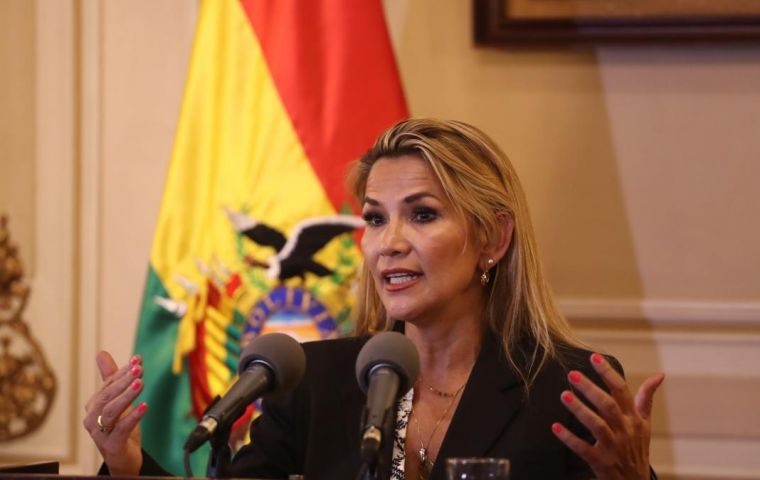MercoPress. South Atlantic News Agency
Bolivia: Áñez gov't sought military help from US and UK, letters show
 Áñez will remain in jail for her administration's illegal actions.
Áñez will remain in jail for her administration's illegal actions. Former interim President Jeanine Áñez had requested military assistance from the US and UK embassies “to repress the Bolivian people,” Citizen Security Deputy Minister Roberto Ríos said Tuesday.
“All this weapons and equipment requested by other authorities were going to be used, presumably, to repress the Bolivian people,” Ríos claimed as he showed letters sent at the time to the diplomatic missions asking for “equipment and weapons,” a move which resembles the assistance allegedly supplied by Argentina and Ecuador in the days leading to former President Evo Morales' resignation and Áñez's subsequent accession to power.
Once in office, the Áñez administration sent May 8, 2020, a note to US Chargé d'Affaires Bruce Williamson: “I ask you to attend to the requirement that I mention about defending the integrity of the Bolivian people and its territory.” The same note mentions “nine sheets of equipment assignment, description and justification,” but no further details have been made available in this particular letter.
On Sept. 25, 2020, the government wrote British Ambassador Jeff Glekin requesting “pistols, cartridges, gas grenades, complete uniforms, gas masks, night goggles, thermals, binoculars, helmets, protective suits and equipment that it considers important for the Bolivian police to defend the integrity of the people, its territory and security.” Ríos explained the original notes, as well as the attachments mentioned therein, were being sought.
He also hoped the diplomatic missions would submit additional answers as to their exact response in the face of those requests. He also explained that his office “does not have the authority to request that type of equipment that is used by special missions of the Bolivian police.”
The official also pointed out that the kind of gear mentioned in the notes “is not the one usually used by the Bolivian police,” which “gives clear indications that all this weaponry and equipment requested by other authorities were going to be used, presumably, to repress to the Bolivian people.”
According to Ríos, these efforts to obtain weapons before the October 2020 elections, where current President Luis Arce was the favourite, were part of a second coup d'état that included foreign mercenaries. Press reports at the time had also mentioned such a follow-up uprising was in the making to ratify what had been done in 2019 against Morales. Documents and recordings of phone calls allegedly linked former Defense Minister Luis Fernando López to a plan “to bring Colombian and Venezuelan hitmen and paramilitaries” to Bolivia to either prevent the elections from going on or Arce from taking office.
In October this year, Government Minister Eduardo del Castillo reported that the same paramilitary groups who participated in the “assassination attempt” in Bolivia during 2020 had been involved in the July 7 killing of Haiti President Jovenel Moïse.
Former Presidents of Argentina Mauricio Macri and Ecuador Lenín Moreno are also under investigation for their alleged assistance to the 2019 military revolt in Bolivia, after supplying equipment used in the Sacaba and Senkata repressions which have been deemed crimes against humanity. At that time, Áñez signed a decree excluding military personnel from criminal accountability for their actions “to restore internal order and public stability.”
The Inter-American Commission on Human Rights (IACHR) concluded in August this year that during the 2019 crisis there were very serious human rights violations, including “summary executions, massacres, racism, torture and sexual assaults.”
Meanwhile, Áñez, who is currently under preventive detention for the case called “coup d'état I,” has been denied house arrest Tuesday. Her defence team has filed an appeal against this decision. She was arrested in March for terrorism, sedition and conspiracy. During her court appearance, Añez insisted she was a political prisoner.
But even if she had been granted house arrest Tuesday, Añez would have remained in jail, because she is also under preventive detention in the case called “coup d'état II.”




Top Comments
Disclaimer & comment rulesCommenting for this story is now closed.
If you have a Facebook account, become a fan and comment on our Facebook Page!